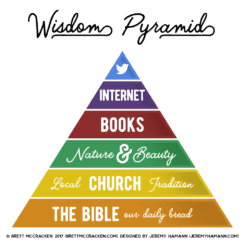
Editor’s Note: To start our New Year, we’re re-running Aimee Fritz’s introduction to her series on Brett McCracken’s “Wisdom Pyramid.” If you would like to read the rest of the series, you may do so here:
Wisdom Pyramid: The Church
Wisdom Pyramid: Nature and Beauty
Wisdom Pyramid: Books
Wisdom Pyramid: The Internet
Wisdom Pyramid: Social Media
Author Brett McCracken posed a question on his blog, asking his readers “to think about what sorts of ‘knowledge groups,’ and in what proportion, feed a healthy life of true wisdom and true joy.” Brett summarized it like this:
“There is little to argue with here, as Christians. We know we need the Bible, Church, Nature & Beauty, and Books to grow in wisdom, knowledge and joy. And we can acquiesce that more of us are finding valuable information on the internet and through our friends on social media.”
Most of us have the “pyramid” that Brett proposed upside-down. When I’m in the carpool line or drifting off to sleep I often have my phone in my hand, not my Bible. I relegate nature and beauty to infrequent field trips to the woods or the art museum. I’m not thinking of what my mind and soul need—I’m thinking of what feels good.
But instead of dismissing this pyramid as being too aspirational, let’s wrestle with it, and think about some hard questions and potential next steps for each level.
Day One
The Bible: “Our Daily Bread”
While the phrase “Daily Bread” has been used for hundreds of years to describe the Bible, perhaps in 2018 our Whole 30 friends out there might prefer to call it our daily sweet potato. Bread is a rich Biblical metaphor, often referring to God’s provision for God’s people. When Moses described how God would continue to guide and lead his people into the promised land, he reminds them, “People do not live by bread alone; rather, we live by every word that comes from the mouth of the Lord” (Deuteronomy 8:3). Later, when Jesus taught his disciples how to pray, he included the phrase “give us this day our daily bread” (Matthew 6:11), reminding us to ask God for what we need every day.
God provides for more than just our physical needs, he provides for our spiritual needs in the nourishment of lasting wisdom in the Bible. It’s supposed to fill us up, strengthen us, and give us energy, but when I’m feeling low I admit I sometimes choose a quick “sugar rush” of likes on Instagram over a more nourishing meditation on Scripture.
Questions:
- How often do you read the Bible? Do you spend more time reading the Bible each week than you spend in church, online, or in nature? Why or why not? How could you increase your time spent in the Bible this week?
- Do you consider the Bible your primary, foundational source of wisdom?
- What are your primary means to interpret, understand, and apply what you read in the Bible?
- Does the Bible satisfy you, give you energy and insight for what lies ahead? If not, what satisfies you more? How do you feel about this?
Next Steps:
- If your phone is always with you, put the Bible on your phone. Apps like YouVersion, NeuBible, and Logos offer several translations, tools, and reading plans. You can also set up emails and notifications to help keep you on track.
- If the Bible feels stale, detached, or dated, try searching key words or topics on Bible apps and websites to find new passages relevant to your daily life. Sites like Bible Gateway make it easy to search for words like justice, mercy, immigrant/alien/refugee, orphan, king/ruler, earth/creation.
- Re-visit the prophets, like Isaiah, Micah, and Amos. These writers have a lot to say about social justice that feels especially relevant today.
- For a fresh perspective, go beyond just reading a different translation. Ask other people what they are reading and how they read the Bible—ask your pastor, ask people living in other cultures or countries, ask people of demographics other than your own. Ask what verses resonate with their experiences; ask what’s challenging them or if they have specific Bible study recommendations. (Bonus point: By posing this question online, you could also redeem some of your social media time.)
- One particularly rich way to interact with Scripture is through the practice of Lectio Divina. After finding a short passage in the Bible, set a timer for 15 minutes. Slowly read the passage or verse through 3-5 times, both silently and out loud. Use all five of your senses to imagine what the story looks, sounds, smells, tastes, and feels like. Put yourself in the place of every character in the story—what do they look like, how do they feel, what is their context and motivation? After several minutes in silence, write down any new understandings about that verse. You may even feel nudged to take specific action.
Tomorrow, we’ll continue to engage with the wisdom pyramid, focusing on the church. Until then, how will you chew your Daily Bread today?
Aimee Fritz delights in telling long, true stories about compassion, souls, and big mistakes among the everyday absurdities of her suburban life. Long ago she consulted companies, churches, and nonprofits. Now she runs Family Compassion Focus to funnel all that into helping people become lovable and loving World Changers. She recently co-wrote the Family Toolkit (free download) for Kent Annan’s Slow Kingdom Coming: Practices for Doing Justice. Loving Mercy, and Walking Humbly in the World (IVP).


